FACULTY

Gernot BODNER is Senior Scientist at the Department of Agricultural Sciences. The focus of his research is crop ecology, aiming to unravel interactions between soil/atmospheric conditions and crop growth as well as opportunities for optimizing adaptation of cropping systems to environmental stresses. Particular attention in several projects has been dedicated to better understanding of crop root systems. As a board member of the Austrian Plant Phenotyping Network, he has established an innovative approach of hyperspectral root system imaging to improving crop drought resistance. Actual research is about hyperspectral root phenotyping in the context of plant water uptake and soil carbon cycling.
Further information
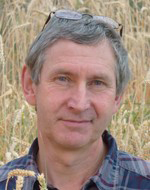
Hermann BUERSTMAYR is Professor for Plant Breeding at the Department of Agricultural Sciences. His work focuses on sustainable improvement of cereal crops through genetic improvement and utilization of genetic resources. He develops modern biotechnology tools for plant improvement, particularly SMART breeding (selection with markers and advanced reproduction technologies). He is an internationally leading expert in disease resistance breeding, particularly Fusarium resistance of wheat. He utilizes precise phenotyping and modern DNA fingerprinting tools to refine and optimize breeding for complex traits, such as marker assisted breeding and genomic selection.
Further information

Juliane DOHM is Associate Professor in the Institute of Computational Biology at the Department of Biotechnology and Food Science. She is expert in the field of Computational Genomics with a special focus on the analysis of high-throughput sequencing data. She developed genome assembly methods and published pioneering work on the properties of data from next-generation sequencing platforms. Besides her main work on assembly, annotation, and comparative analyses of genomes from cultivated and wild plants she is involved in projects dealing with population genomics and metagenomics. Her teaching activities cover fundamental computational skills for bioinformatics as well as specialized data analysis courses.
Further information

Astrid FORNECK is a leading scientist in grapevine physiology focusing on abiotic stresses. She develops decision-based strategies for grapevine management in cool climates, linked to precision viticulture responding to climate change. She utilizes genomics, transcriptomice and classical plant physiology techniques in field and controlled environments. Her research focuses on stress physiology with focus on below-above ground stress signaling, stress induced carbohydrate allocation with impact on fruit quality and quantity. She employing various – omics techniques and runs a biotechnology & physiology lab.

Stephan HANN is Associate Professor and head of the Institute of Analytical Chemistry at the Department of Natural Sciences and Sustainable Resources. His research group "Instrumental Analytical Chemistry and Metabolomics” performs metabolic profiling, metabolic flux analysis and non-targeted analysis metabolomics in biological systems. Current method development is mainly focused on biotechnology (in acib and BioToP) and plant/soil related research. Additional research addresses method development for investigation of metal/protein interaction, elemental ultra-trace analysis in the aquatic environment and elemental speciation analysis in environmental, biological and biomedical samples.
Further information
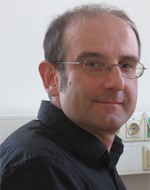
Heinz HIMMELBAUER is full professor of Bioinformatics at the Department of Biotechnology and Food Science. With over 25 years of experience in the field, he is author and co-author of 115 refereed publications that have received more than 12,000 citations overall. His research interests focus on comparative and evolutionary genomics of beet crops (Beta vulgaris). Analyses are based on high-throughput sequencing data from next-generation sequencing platforms. Special emphasis is placed on the de novo assembly of genome sequences and gene annotation. Aside from beets, he also works on the genomes of other plants, e.g. quinoa (Chenopodium quinoa) and the tobacco Nicotiana benthamiana.
Further information

Barbara KORBEI is a Principal Investigator at the Department of Biotechnology and Food Science. The main focus of her research is vesicular trafficking and sorting pathways in the endosomal system of higher plants with an emphasis on the degradation of plasma membrane proteins, which is under tight regulation. Her work is centered on the model plant Arabidopsis thaliana and her research group uses state of the art genetic and cell biological methods as well as Confocal Laser Scanning Microscopy to unravel mechanisms in the fine-tuning of pathways essential for responses to biotic and abiotic stresses and adaptation of higher plants to changing environmental conditions.
Further information

Gábor MÉSZÁROS is an Associate Professor at the Institute of livestock sciences, Animal breeding and genetics working group. Currently, he is fully committed to understanding the diversity of populations and architecture of traits based on genomic data, a topic that was also the focal point of his habilitation in 2018. His research is centered on genomic data, both single nucleotide polymorphism (SNP) and whole genome sequence data. He is working on a diverse range of livestock species and companion animals. Regular teaching activities related to animal genetics for MSc and PhD students are a considerable part of his commitments, both at BOKU and on the international scene.
Further information

Rainer Schuhmacher is Professor at the Department of Agricultural Sciences, at Bio-Resources & Technologies Tulln and head of Metabolomics. The research interests of his working group Plant-Microbe Metabolomics are centred around the development and application of novel, isotope-assisted workflows for metabolomics research. A special focus is put on the investigation of the molecular mechanisms underlying plant-pathogen- as well as beneficial microbe-plant interactions. Another major topic of interest is metabolomics of abiotic stress in plants. His research is complemented by purification and characterization of bioactive compounds as well as analytical quality assurance in metabolomics.
Further information
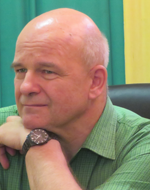
Johann SÖLKNER is Professor of Animal Breeding and Population Genetics and currently head of the division Animal Breeding and Genetics. He is an animal geneticist and livestock breeder with great interest in high tech as well as low tech solutions. Along the high tech route, he uses high throughput genomic data for support of breeding decisions and a better understanding of the biology of livestock species. In developing countries, he tries to help establish simple breeding programs for genetic gains and a better livelihood of livestock keepers. Sölkner is currently vice president of the European Federation of Animal Science.
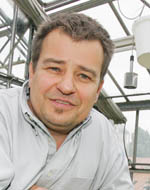
Joseph STRAUSS is Full Professor for Fungal Genetics and Head of the Institute of Microbial Genetics. His research interests are linked to molecular-genetic and epigenetic regulation of fungal primary and secondary metabolism. His group works with saprophytic species where they study the impact of metabolic gene regulation pathways for fungal nitrogen cycling functions in soil environments. They also work with phytopathogenic fungi where they study the role of chromatin-based epigenetic mechanisms for the expression of secondary metabolites and other virulence factors. He leads the “BiMM-Bioactive Microbial Metabolite” research and infrastructure platform at the BiRT Campus Tulln in which the scientific team uses high-throughput technology and innovative culturing techniques to identify and characterize novel microbial metabolites with agricultural and medical application potential.
Further information
Johann VOLLMANN is Associate Professor at the Plant Breeding Division, Department of Agricultural Sciences of BOKU. His recent activities are focusing on applied genetic and plant breeding research soybean with particular attention to harvest product quality traits. Germplasm development comprises breeding materials with high seed protein content, decreased cadmium uptake or reduced allergenicity for food-grade soybeans. Moreover, research on selection for bio-active compounds such as spermidine has also been initiated. Field phenotyping, near-infrared reflectance spectroscopy for seed traits and genetic markers are applied for introgression of particular traits into adapted breeding materials.
Further information
Associated Faculty Members

Birgit FÜRST-WALTL is Senior Lecturer at theDepartment of Agricultural Sciences, Division Livestock Sciences. Her research area includes different aspects of livestock breeding, genetic evaluations and breeding programmes. In particular, she focuses on the definition, recording and genetic analyses of (novel) traits and establishing breeding objectives which are both, sustainable and economically feasible. In this context, she closely cooperates with breeding organisations and has taken a leading role in several research projects. She teaches undergraduate and graduate courses in the field of Livestock Sciences.

Claudia JONAK is Principal Scientist at Center for Health and Bioresources at the AIT Austrian Institute of Technology. Plants are frequently challenged by unfavorable environmental conditions. Drought, temperature extremes or pathogen infections limit plant growth and development. Research in her team focuses on the mechanisms that plants use to cope with stress and explore their potential for new crop improvement strategies. Emphasis is placed on how signal transduction cascades regulate the coordinated responses of cellular metabolism and chromatin-related processes.

Eszter KAPUSI is a senior scientist at the Department of Agricultural Sciences. She has over ten years of expertise in genetic transformation of cereals (biolistic and Agrobacterium tumefaciens-mediated), tissue culture and doubled haploid techniques. Her main area of research is CRISPR/Cas9 mediated genome editing of cereals, molecular pharming using seed crops, and characterisation of the phiC31 Integrase system in monocotyledonous (Hordeum vulgare) and dicotyledonous (Arabidopsis thaliana) model plants.
Further information
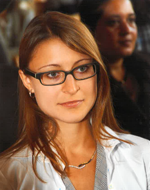
Katharina KEIBLINGER is Senior Scientist at the Institute of Soil Research, at the Department of Ecosystem Management, Climate and Biodiversity. Her research focuses on soil nutrient cycling and microbes active during these processes. She studies climate change, extreme events, and land-use on soil and biotic and abiotic processes, such as emission of soil greenhouse gases linking nutrient cycling and microbes active during these processes via “metaproteomics”. Her scientific interest also includes sustainable food production systems, soil pollution and land degradation, as well potential mitigation strategies.

Theresa SCHARL-HIRSCH is Senior Scientist at the Institute of Statistics. Previously she worked as a researcher in the Austrian Center of Industrial Biotechnology (acib). Her research interests include statistical computing, cluster analysis, classification, machine learning and statistical applications in life sciences. She has experience in the analysis of high-dimensional data of bioprocesses such as (time-course) gene expression data from microarrays or RNA sequencing. A second line of research is on the (real-time) monitoring and control of upstream and downstream processes.
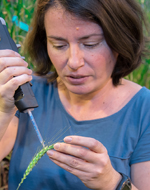
Barbara STEINER is Senior Scientist at the Department of Agricultural Sciences. Her research focuses on genetics and genomics of cereal crops and the major disease Fusarium head blight. Thereby the genetic analysis of the quantitative resistance, high-resolution mapping of the resistance loci and resistance gene isolation are main research tasks. As a plant breeder she is particularly interested in breeding bread wheat and durum wheat for increased Fusarium head blight resistance including germplasm evaluations, characterization and utilization of genetic resources, pre-breeding and the development of methods and tools for genomics-assisted breeding.
Further information
